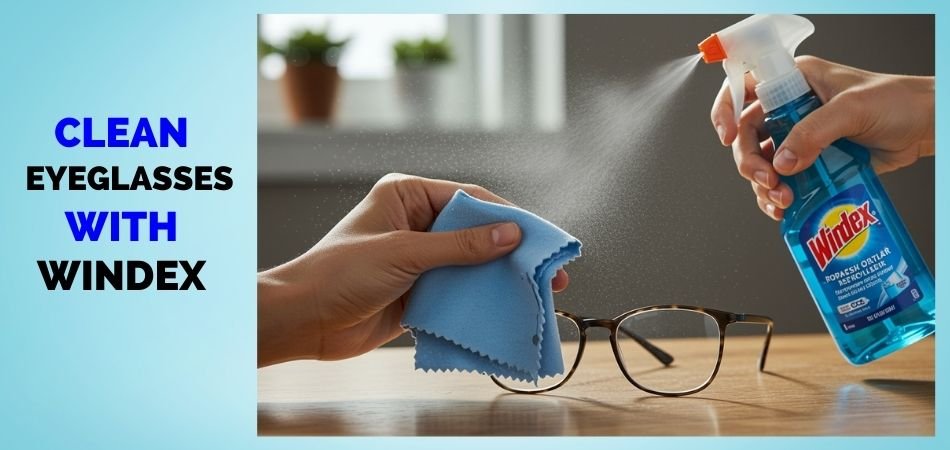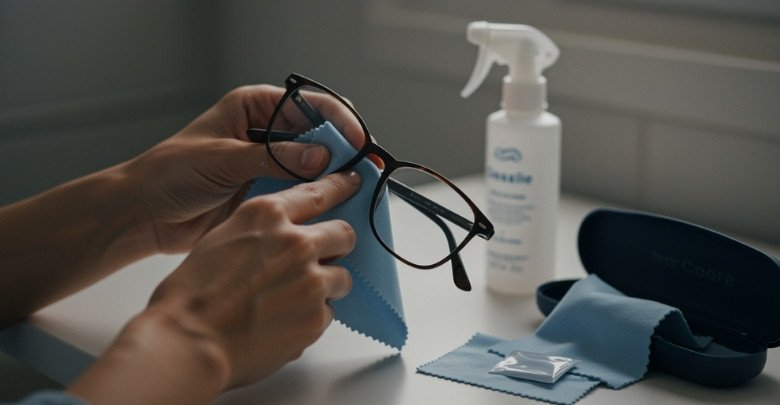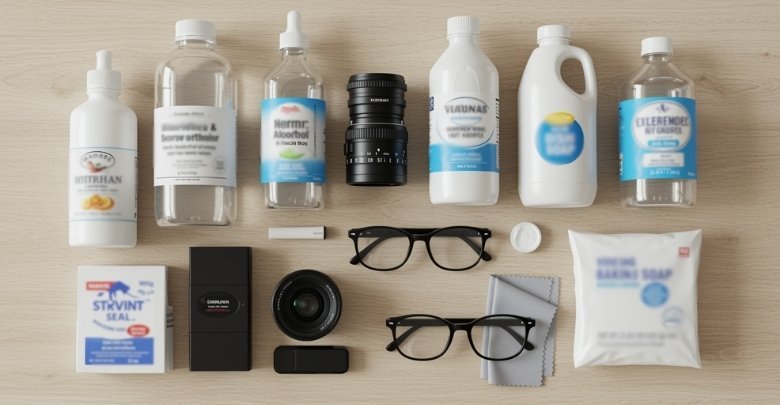Windex is a popular household glass cleaner known for its ability to leave windows and mirrors sparkling clean. With its strong formula, a common question arises: Can you clean eyeglasses with windex?
No, you should not clean eyeglasses with Windex. It contains ammonia and harsh chemicals that can damage lenses and coatings, leading to scratches or deterioration over time. Use a cleaner specifically designed for eyeglasses or mild soap and water for safe, effective cleaning.
As we proceed in this article, we will discuss why Windex isn’t safe to use on eyeglasses, as well as the best methods for properly caring for your glasses.
Can You Clean Eyeglasses With Windex?
No, using Windex to clean your eyeglasses is not a good idea. You may think it’s a quick solution, but there are better ways to keep your lenses clean. Read below to understand why Windex isn’t safe for your glasses.

Ammonia in Windex
Windex has ammonia, which is strong and can hurt your eyeglasses. Ammonia can slowly break down the special layers on your lenses. These layers help protect your glasses from scratches and glare. When ammonia damages them, your glasses become weaker. Over time, this can lead to peeling and cracks.
Damage to Lens Coatings
Many eyeglasses come with coatings like anti-glare or scratch protection. Windex can damage these thin and helpful layers. Once the coatings are ruined, your lenses can scratch easily. Scratched lenses can make it harder to see clearly. The damage also makes the glasses look old and worn out.
Harsh Chemicals
Besides ammonia, Windex has other strong cleaning chemicals. These chemicals are safe for windows but too strong for eyeglasses. They can make the lens material weak. This can cause the lenses to wear out or break faster. The damage might not be seen right away, but it gets worse over time.
Scratches Over Time
Using Windex again and again can create tiny scratches on your lenses. These scratches might be small at first, so you may not notice them. But they can build up and make your vision blurry. Scratches also make your glasses look dull and old. Soon, you might need to replace them.
Lens Discoloration
Some chemicals in Windex can change the color of your lenses. Your lenses might turn yellow or look cloudy. This makes it harder to see through them clearly. Discolored lenses can also make your glasses look dirty even when they are clean. This can be annoying and expensive to fix.
Shorter Lifespan
Cleaning your eyeglasses with Windex can make them wear out faster. The coatings can peel, scratches can grow, and the lenses can turn cloudy. All of this can shorten the life of your glasses. You may have to buy new glasses sooner than expected. That can cost more money and time.
Steps You Can Take to Clean Eyeglasses Without Harsh Chemicals
Your eyeglasses should be kept clean to maintain clear vision and comfort. However, using the wrong cleaners can damage your lenses. There are simple and safe ways to keep your glasses spotless. Here are some easy steps to cleaning your eyeglasses without harsh chemicals:
Step 1: Use Mild Soap
A few drops of mild dish soap can work wonders. Make sure the soap does not have added lotions or strong scents. Gently rub the lenses with your fingers. This helps remove dirt and oil without harming the lenses. Always rinse the soap off with clean water.
Step 2: Warm Water Rinse
Before using any soap, rinse your glasses under warm water. This helps wash away dust and tiny particles. Rinsing first can prevent scratching the lenses while cleaning. Make sure the water is not too hot, as heat can harm the lens coatings. A gentle stream of warm water works best.
Step 3: Soft Microfiber Cloth
Dry your eyeglasses with a clean microfiber cloth. These clothes are soft and made for cleaning lenses. They won’t scratch the surface like paper towels or rough fabrics. Always keep a microfiber cloth handy for quick clean-ups. Wash the cloth regularly to keep it clean and soft.
Step 4: Lens Cleaning Spray
If you prefer, use a lens cleaning spray made for eyeglasses. These sprays are gentle and safe for all lens types. Spray a small amount on both sides of the lenses. Wipe with a microfiber cloth to remove smudges. Always choose sprays that are alcohol-free and ammonia-free.
Step 5: Utilize Advanced Eyeglass Cleaning Tools
For a deeper clean, try advanced tools made for eyeglasses. There are several options on the market, one of which is peeps by Carbon Klean, a simple but effective product. It can safely remove fingerprints and oils without using liquid cleaners. These tools are gentle and designed to protect lens coatings. They are a great choice for keeping your glasses spotless.
Step 6: Handle Frames Carefully
Hold your glasses by the frames while cleaning. This keeps pressure off the lenses and prevents bending or breaking. Be gentle when wiping the lenses to avoid scratching them. Holding the frames also helps keep fingerprints off the clean lenses. Careful handling can make your glasses last longer.
Step 7: Regular Cleaning Routine
Make cleaning your glasses a daily habit. Regular cleaning stops dirt and oils from building up. It also keeps your vision clear and your glasses looking new. Don’t wait for your lenses to get too dirty. A simple daily clean can save time and keep your glasses in top shape.
How to Protect Your Eyeglasses During the Cleaning Process?
Cleaning your eyeglasses may seem simple, but small mistakes can lead to scratches or damage. Even gentle cleaning can harm lenses if not done right. Luckily, there are smart ways to avoid common problems. Keep reading to learn some helpful tips to protect your glasses while cleaning!

Clean Hands First
Before touching your glasses, wash your hands with mild soap. Dirty or oily hands can leave smudges or even scratch the lenses. Dry your hands completely with a soft towel. This small step keeps your lenses cleaner and safer. Clean hands make a big difference.
Check for Loose Screws
Take a quick look at your glasses before cleaning them. If the screws in the frame are loose, cleaning them can make them worse. Loose screws can cause the lenses to shift or fall out. Tighten them gently with a small screwdriver if needed. This prevents further damage during cleaning.
Use Clean Water Only
Always use clean, fresh water when rinsing your glasses. Dirty water can carry particles that scratch your lenses. Never rinse glasses in sinks with leftover soap or debris. A simple rinse with clean water helps avoid unexpected damage. Fresh water is always the safest choice.
Clean in a Safe Spot
Pick a safe, flat place to clean your glasses. Avoid cleaning over sinks, tiled floors, or anywhere they can fall and break. Lay a soft towel down to catch them if they slip. Cleaning in a safe spot reduces the risk of dropping and damaging your glasses.
Inspect Lenses Regularly
After each cleaning, take a moment to inspect your lenses. Doing this helps you avoid scratches while cleaning glasses and spot any new chips or loose parts early. Finding problems early can stop them from getting worse. If you notice damage, avoid further cleaning until it’s repaired. Regular checks keep your glasses in top condition.
Avoid Sharp Objects Nearby
Keep sharp or rough objects away while cleaning your glasses. Items like keys, jewelry, or tools can easily scratch the lenses if they bump against them. Always clear your space before starting. A clutter-free area helps protect your glasses from accidental harm.
Signs Your Lenses Are Being Damaged by Cleaning Products
Not all cleaning products are safe for eyeglasses. Some can cause slow but serious damage to your lenses over time. Here are clear signs that your cleaning routine might be harming your glasses:
- Small Scratches Appear: You notice tiny scratches that seem to grow each time you clean the lenses, even with a soft cloth.
- Coating Peels or Bubbles: The protective coating starts to peel or bubble, making the lenses look rough or uneven across the surface.
- Blurry Spots Develop: Certain areas on the lenses stay blurry, no matter how carefully or often you clean them.
- Lens Color Changes: Your lenses start to show a yellow or cloudy tint, making it harder to see clearly through them.
- Increased Glare Issues: You struggle with more glare during the day or night, which wasn’t a problem before cleaning.
- Faint Lines or Streaks: Cleaning leaves behind lines or streaks that won’t wipe away, even when using a clean microfiber cloth.
- Frames Feel Loose: The frames or lens edges seem looser than before, which can result from harsh chemical damage.
- Unpleasant Odor: An odd chemical smell lingers on the lenses, a sign that the cleaner is too strong or harmful.
Which Household Products Are Safe for Lens Cleaning?
You might be surprised that some simple things at home can safely clean your glasses. But not everything you grab will protect your lenses. It’s important to know what’s gentle and what’s not. Check below to see which safe household products you can trust:

Mild Dish Soap
Mild dish soap is gentle and works well for removing grease and dirt. Pick a soap without added lotions or harsh scents. Use just a drop mixed with warm water. Rub the lenses gently with your fingertips. Always rinse them well to avoid soap spots.
Warm Water
Warm water helps wash away dust and small debris before wiping. This keeps small particles from scratching the lenses. Make sure the water is not hot, as heat can damage coatings. Use a soft flow of water instead of a strong spray. Warm water is the safest first step.
Vinegar
Many people choose to clean eyeglasses with vinegar when dealing with tough smudges or greasy spots. Mix one part white vinegar with three parts water for a safe solution. Apply the mixture gently using a soft, clean cloth. Always rinse the lenses well with clean water afterwards.
Cotton Swabs
Cotton swabs are handy for cleaning tiny, hard-to-reach spots. They work well around nose pads and frame edges. Use them dry or dampened with clean water. Always be gentle to avoid scratching the lenses. Cotton swabs are a simple tool already found in most homes.
Clean Soft Towel
A soft, clean cotton towel can be used for drying. Make sure it’s smooth and free of rough fibers. Avoid using paper towels, which can scratch the lenses. Pat the lenses gently instead of rubbing. Always use a fresh towel to prevent dirt transfer.
Baking Soda (for Frames Only)
Baking soda can safely clean stubborn dirt on plastic or metal frames. Mix it with a little water to make a soft paste. Gently rub the frames, avoiding the lenses. Rinse well with clean water after scrubbing. Baking soda removes grime without using harsh chemicals.
Frequently Asked Questions
People often have questions about how to clean eyeglasses safely. Below are some helpful FAQs covering concerns not already discussed in the article. These will give you extra tips and clear up common doubts about keeping your glasses clean without damage.
How Often Should You Clean Your Eyeglasses?
It’s a good idea to clean your eyeglasses once a day. Regular cleaning prevents oils, dust, and smudges from building up. Daily cleaning also helps maintain clear vision and prevents long-term damage caused by dirt grinding into the lens surface.
What Happens If You Use Ammonia on Eyeglasses?
Ammonia can break down the protective coatings on eyeglasses. This can lead to scratches, peeling, and blurry spots over time. Avoid using any household cleaner with ammonia when cleaning your lenses to keep them clear and safe.
Can Eyeglasses Be Cleaned With Hand Sanitizer?
No, hand sanitizer contains alcohol and other chemicals that can damage lenses and coatings. While it may kill germs, it can also cloud or scratch lenses. Stick to mild soap and water or lens-safe sprays designed for eyeglasses.
Is It Okay to Blow on Lenses Before Wiping?
Blowing on lenses is not recommended. Your breath contains moisture and tiny particles that can land on the lenses. This may lead to streaks or even introduce small particles that cause scratching during wiping.
What Should You Avoid When Drying Eyeglasses?
Avoid using tissues, paper towels, or rough fabrics when drying eyeglasses. These materials can scratch the lens surface. Always use a soft, clean cotton cloth or a microfiber cloth for drying and wiping your lenses safely.
What Should You Do If You Damage Your Lenses?
If your lenses show damage like scratches or peeling, stop using harsh cleaners right away. Visit an optical store or speak to a professional about repair options. Trying to fix the damage yourself can make the problem worse.
Bottom Line
Maintaining clean eyeglasses is important, but choosing the right cleaning method is even more important. Many people wonder, Can you clean eyeglasses with Windex? The answer is no. Windex contains ammonia and other harsh chemicals that can harm your lenses and coatings. Using it regularly can lead to scratches, peeling coatings, discoloration, and a shorter lifespan for your glasses. Instead, gentle household products like mild dish soap, warm water, and a clean, soft towel are much safer options.
For tough smudges, a diluted vinegar solution can also work without damaging your lenses. Always handle your glasses carefully and clean them in a safe space. By following these simple tips, you can keep your eyeglasses clear, comfortable, and in great condition for years.






